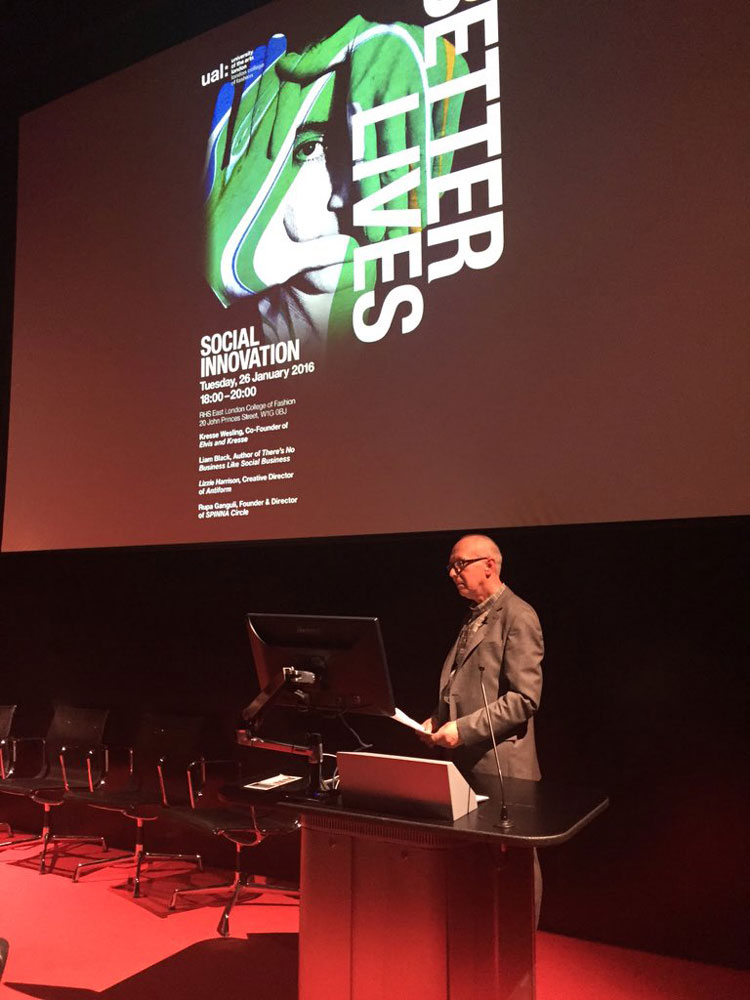Earlier this week LCF’s Social Responsibility team hosted the first of this year’s Better Lives Lectures. The theme of the evening was Social Innovation and speakers included Lizzie Harrison – LCF alumna and Creative Director of Antiform, Liam Black – author of There’s No Business Like Social Business, Rupa Ganguli – Founder and Director of SPINNA Circle, Kresse Wesling, Co-Founder of Elvis and Kresse.

The evening was introduced by Dr Philip Sams, Honorary Doctor at LCF and Visiting Professor at Northumbria University, who then chaired a panel discussion after each of the guests presented the inspiring work they are involved it.
Liam Black kicked off the evening with a discussion looking at what it means to be a social entrepreneur, which he believes to be:
A person who establishes an enterprise with the aim of solving social problems or effecting social or environmental change. A change-maker who brings imagination, innovation and persistence to address deep seated social problems.
He gave a presentation about the kinds of social and environmental enterprises he has invested in including: K10 who offer young apprenticeships in construction, and Unforgettable.Org which aims to improve the lives of those living with memory loss and dementia by bringing together specialised products, practical advice and a supportive community. He also gave a more in-depth case study of his work with Jamie Oliver’s incredibly successful Fifteen restaurant initiative.
It’s all about identity, purpose and belonging. – Liam Black
Liam explained that it’s important for people to feel that they are an essential part of a real enterprise – not just a training scheme.
Kresse Wesling co-founder of Elvis and Kresse also commented that creating a community is vital, and went on to explain why they give 50% of their profits to The Firefighters charity. Elvis and Kresse have been reclaiming heroic materials since 2005 after discovering that London Fire Brigade’s decommissioned fire-hoses were destined for landfill. They began using it to create bags and accessories in their plight for ‘a time without landfill, when everything is recycled or composted’.
Karma is a real thing – when you do good things, good things happen to you – Kresse Wesling
Kresse also spoke about their next project, working with leather. Tonnes of leather waste is produced in the UK each year but instead of designing products with it, they have created three shapes that can interlock to create all sorts of leather items – from rugs, to cushions.
Rupa Ganguli presented her company SP!NNA Circle which aims to “empower women in fashion and textiles globally“. The company has created a network of local hubs of female designers, artisans and entrepreneurs that are skilled in fashion and textiles, all across the world, giving them a platform to connect not only with each other, but with business professionals, buyers and industry experts.
LCF alumna and Creative Director of Antiform, Lizzie Harrison discussed her work with Antiform, who are a team experienced team of local designers, researchers and communicators, using reclaimed and recycled materials to combine fashion and heritage craft within local communities. Their work highlights how social innovation can liberate the power of people and materials.
The evening ended with a panel discussion, responding to audience questions, and advocating tenacity, drive, self-confidence and resilience when starting a social innovation project. And audience members and panellists all agreed with what was perhaps one of the most important comments of the evening, from Kresse Wesling, that nowadays:
If you’re thinking of starting an unethical fashion business, don’t bother – you will definitely fail! – Kresse Wesling
The Better Lives lecture series for 2016 is presented in collaboration with the LCF Social Responsibility team, MA Fashion Futures and MA Fashion Media Practice and Criticism.

